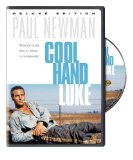| Reviews & Columns |
|
Reviews DVD TV on DVD Blu-ray 4K UHD International DVDs In Theaters Reviews by Studio Video Games Features Collector Series DVDs Easter Egg Database Interviews DVD Talk Radio Feature Articles Columns Anime Talk DVD Savant Horror DVDs The M.O.D. Squad Art House HD Talk Silent DVD
|
DVD Talk Forum |
|
|
| Resources |
|
DVD Price Search Customer Service #'s RCE Info Links |
|
Columns
|
|
|
Cool Hand Luke - Deluxe Edition
"Some men, you just can't reach."
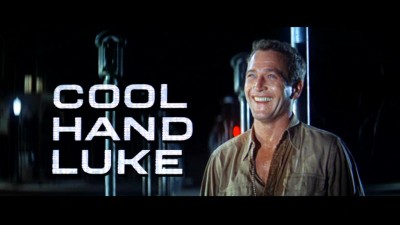
A beautiful, cruel, funny, deeply sad film. Cool Hand Luke, Paul Newman's most iconic role (in a career full of them), has been re-released on DVD by Warner Bros. in a deluxe edition which includes a sparkling new anamorphic transfer and a handful of extras such as a full-length commentary track and a newly produced documentary on the film. Fans of the 1967 counter-culture chain-gang picture who already own this title (Warner Bros. released it way back in 1997) should feel more than comfortable in double-dipping on this quality upgrade ("Buyin' that new disc up here, boss?" "Yeah, buy that new disc, there, Drag.")
Set in a backwoods Florida chain-gang after the war (the film plays it cool as to which war - WWII or Korea - to keep the film undated), Cool Hand Luke begins with the crime that puts decorated war hero Lucas Jackson (Paul Newman) on a chain gang for a two-spot: cutting the heads off municipal parking meters. Arriving with five other "new meat," Luke already stands out with the Captain (Strother Martin), the soft-spoken but sadistic warden of the prison camp, because of the surreal, seemingly nonsensical nature of his crime - one the Captain readily admits he's never seen before. And it's not just the Captain who takes notice of the new prisoner Luke; Luke's thoughtful yet stubborn loner qualities attract attention among the regulars of the bull-gang, chiefly Dragline (George Kennedy, in an example of actor and role perfectly meshing), the massive, bear-like head of the cons, as well as the camp's bosses, particularly the silent, menacing Boss Godfrey (Morgan Woodward).
Luke is contemptuous of the rules and regulations laid down by both the Captain and the guards, and Dragline and the other cons - a contempt he makes known with no fear (and with, perhaps, no sense of what's in his own best interest, as another con and Luke states later in the film). But he sticks to the rules, playing it cool, until his defiant, smart-ass nature won't allow him to stay low anymore. Ticking off Dragline one too many times (Luke tells Dragline to shut up, when Drag is tormenting the men with a recap of the sexy woman the men saw on the chain gang), Luke has to box Drag (the camp's method of settling scores, as well as entertainment for the sullen guards). Beaten badly by Drag, Luke still refuses to give up, never quitting the fight, which earns him the respect of Drag and the other cons (and the wary concern of the Captain and the guards), which Luke further solidifies when he successfully bluffs Drag's sidekick Koko (Lou Antonio) in a big poker match.
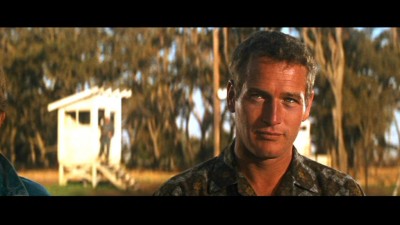
SPOILERS ALERT!
1967 was the year mainstream Hollywood exploded in terms of incorporating on the screen the themes, the energy, and the ideas behind the growing counter-culture and the seismic sociological shifts occurring at that time in the United States. 1967 saw the release of such iconic, ground-breaking Hollywood films as The Graduate, Bonnie and Clyde, The Dirty Dozen, (all of which exploited the screen's new-found acceptance of increasingly frank depictions of sex and violence), while even more "conventional" films such as In the Heat of the Night, Guess Who's Coming to Dinner?, and To Sir, With Love (importantly, all starring Sidney Poiter), safely incorporated timely topical themes (in these cases, race) into familiar entertainments. Foreign imports as well, including Leone's Dollars trilogy with Clint Eastwood, and Sweden's I Am Curious (Yellow) brought to American art houses and drive-ins a startling graphic take on sex and violence that would only escalate from this historical point.
Which brings us to Cool Hand Luke. Regarded today as one of the most entertaining films of the 1960s (and certainly in the running among fans and critics as Newman's best performance), watching it now in relation to those other titles, it hardly seems showily "groundbreaking," in either themes or execution. And indeed, when the film was released, it received generally positive - but certainly not outstanding - reviews. Quite a few critics merely saw it as a visually arrestingly but essentially tired retread of earlier, better films such as I Am a Fugitive From a Chain Gang, and indeed, it received as many knocks as Newman's previous attempt at inhabiting an old film genre for Warner Bros. - the private eye film - in 1966's cooly received Harper. Viewed against the films listed above, Cool Hand Luke seems almost positively quaint in its depiction of violence; Luke may be subjected to increasingly harsh cruelty as the film progresses, but a stick across his back pales in comparison to Lee Marvin and Jim Brown gleefully pouring gasoline on Nazi officers and their wives in The Dirty Dozen. And except for one memorably erotic, dirty-joke sequence where incredibly endowed farm-girl Joy Harmon drives the chain gang wild by washing a car (Harmon claims in the new documentary she didn't understand the implications of director Stuart Rosenberg having her playfully spread the orgasmic soap suds all over her wet stomach), there's more sex in the "family friendly" James Bond extravaganza You Only Live Twice that year, than in Luke.
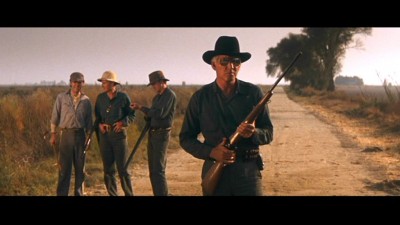
Yet despite the classic, almost nostalgic structure of Cool Hand Luke in comparison with those other films, I think (and I would imagine many, many fans of the film - mostly men, because the women I've talked to find it too cruel and sad) it's the equal of those other iconic films of 1967, a cultural touchstone that escapes the bounds of its more topical (for 1967) considerations because of its "timelessness." Deeply saturated in religious fable and myth-making allegory, for years critics have debated the obvious Christian symbolism loaded throughout the film (Cool Hand Luke is an excellent primer for beginning film critics, because its symbolism is so overt and plentiful), symbolism that ameliorates (and strangely compliments) the existential aspects of the film. While Newman obviously didn't invent the "antihero" in films (you can find prototypes all the way back to the silents, despite some historians insisting the character proper can't be dated before WWII), he certainly specialized in such roles, and his portrayal is so strong and assured here, it's easy to see how critics and viewers view his turn as "Cool Hand" Luke as the first inkling of what was to come in rootless, emotionally cut-off movie heros of later sixties and seventies films.
Cool Hand Luke isn't exactly subtle in its presentation of Luke-as-Christ figure/cosmic existential loner-fighting-The System. Frank R. Pierson's screenplay, and Stuart Rosenberg's direction, are unabashed in their embrace of flagrant symbolism. The first shot in Cool Hand Luke is a huge close-up of a parking meter, reading "VIOLATION" in white block letters against a red background - which pretty much sums up what you're going to get as far as nuance here. Existential angst ping-pongs back and forth with Christian imagery, creating almost a fairy-tale atmosphere that's miles removed from any kind of true, gritty "reality" of a chain-gang in Florida. While Luke "settles an old score" with society, with faceless authority, with convention, with bourgeois order by cutting off the heads of municipal parking meters, while he expresses his barely concealed contempt for the cons who mimic the cruel guards in their rules and regulations, while he plays a dangerous game of building himself up to be an existential hero in the eyes of the men ("Sometimes nothing can be a real cool hand."), he also acquires a biblical stature that would seem entirely at odds with this other orientation.
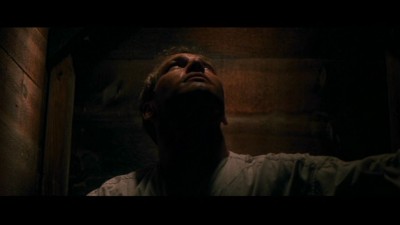
Christ and bible references saturate Cool Hand Luke, the most obvious being after the famous egg-eating contest, when Luke is shown from above, laid out on a table in the familiar Christ-on-a-cross pose. As well, when Luke is put away in the "box" when his mother dies, Luke dons a white nightshirt (not unlike a robe) and is shot looking skyward, the light filtering down in a fair approximation of the way George Stevens shot Max Von Sydow in The Greatest Story Ever Told. "Walking Boss" Godfrey is clearly designed to be Satan - the "Man with No Eyes," as the cons call him (Satan in the bible was described as having no eyes), an evil figure clad all in black who never speaks except in terms of death at the end of his rifle. Godfrey (perhaps "God-fried," a.k.a. God's favorite angel sent down to rule Hades?), in no uncertain terms is the opposite number of Christ/Luke, who recognizes his nemesis' power immediately (in the film's best bit of symbolic allegory, which many critics seem to miss, Luke snatches up a threatening rattler, which Godfrey kills. Luke tosses the snake up to Boss Godfrey and says, "You forgot your walkin' stick, Boss!" In the Bible, Satan's walking stick was a serpent). And twice in the film, Luke appeals directly to God, his father (calling him "Old Man"), asking why he has forsaken Luke ("Love me, hate me, kill me! Just let me know you're there!"). Indeed, at the end of the film, in a dilapidated church where Luke awaits his fate, he appeals once more to God ("You made me like I am. Where am I supposed to fit in?"), getting no answer. Many have taken the resulting silence to be the film's judgement that existentialism wins out over religion, but they forget that Luke continues to address God despite this rejection ("I guess you're a hard case, too."); he still believes he's up there. Existentialism and religious uncertainty coalesce, strengthening each other.
Of course, if you're not in the mood for philosophical explorations, you can just take Cool Hand Luke for an expertly crafted drama/comedy/actioner. While the Luke character, unable to love or accept others' love, to his emotional detriment, isn't exactly a "safe" or enjoyable fantasy figure to project oneself on to to vicariously enjoy the macho thrills of a prison picture (he rejects his mother's love and concern his whole life, as well as his wife's, the cons who looked up to him, and the child-like Dragline - "Where you going?" Drag dejectedly asks when they escape. "Just on my own," the cold Luke replies), Cool Hand Luke is such an entertaining picture outside of its philosophical underpinnings that one can lose oneself in the mechanics of the whole thing. The rugged individualist who absolutely refuses to bend to any authority is perhaps the single most influential male archetype in American culture, and on that level, Cool Hand Luke may be the most satisfying exploration of that particular ideal. Craftily, the film doesn't put Luke in the same league as the killers in say, The Dirty Dozen; had Luke been a rapist or murderer, no one would want to identify with him, no matter how charming he turned out to be (cutting the heads off parking meters is comical, not morally repugnant). It also helps that Luke is played by Paul Newman, at the absolute zenith of both his craft and his Roman-bust good looks (who the hell wouldn't want to be Luke, even with all the beatings, if you could look and act like Newman?). Newman, such a skilled actor (often overlooked because of his stunning looks), is effortlessly funny and heroic as Luke; his "put-on" manner, having been given a workout in Harper, is honed to perfection here (the egg-eating contest is a true classic). Male action fans who like their heroes suitably macho and martyred, will find their dream film here in Cool Hand Luke. And while we don't get the ending one expects from such a film when we wish to live vicariously through a charismatic character, we do get to become myths at the end, "genuine world shakers" - the next best thing to busting out of prison and escaping the law.
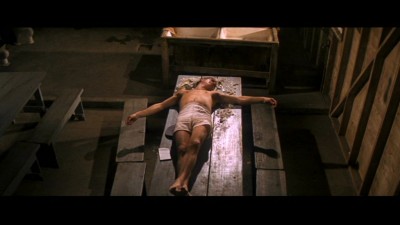
The DVD:
The Video:
Sensational. The back of the DVD states that the anamorphically enhanced, 2.35:1 widescreen transfer for Cool Hand Luke has been taken from restored picture and audio elements, and I believe it. Grain inherent in the original elements is present, of course, but greatly reduced, and color values are beautifully subtle here. Master cinematographer Conrad Hall's saturated color palettes have been carefully restored, lending many scenes an almost 3D effect in his deep depth-of-focus, depth-of-field frames. Compression effects are nil, and the picture is agreeably sharp.
The Audio:
Happily, the original mono mix for Cool Hand Luke has been maintained and cleaned up, lending a super-sharp clarity to the big, fat mono field. I know I enjoy new 5.1 mixes whenever classics are "restored" and cleaned-up, but you can't argue with keeping the original mono in lieu of an artificial stereo mix. There's a French mono track, as well, and English subtitles and close-captions, too.
The Extras:
There's a new documentary, A Natural-Born World Shaker: Making Cool Hand Luke, which features interviews with the late Stuart Rosenberg, Frank Pierson, George Kennedy, Lou Antonio, author of the original novel Donn Pearce, Ralph Waite, Anthony Zerbe, Lalo Schifrin, Hank Moonjean, Joy Harmon, and Eric Lax, a biographer of Paul Newman. It runs 28:44, and it's reasonably comprehensive in discussing what makes Cool Hand Luke so important. Unfortunately, Newman was either unable or unwilling to participate here. There's also a full-length commentary track featuring Eric Lax which is only okay when detailing some of the background of the film's production. Often times, though, Lax merely repeats what was already said in the documentary featurette, or simply repeats lines that an actor just said, and then explains their obvious meaning. The commentary track here is, unfortunately, not up to snuff for the importance of the film. The equally iconic original theatrical trailer is included here, as well.
Final Thoughts:
The original trailer says it all: "the motion picture that simply will not conform." Paul Newman gives his best performance as the Christ-like existentialist "Cool Hand" Luke, outrunning bloodhounds and battling the guards while refusing to ever give up - even when he knows that the fight is, in the long run, futile. An aggressive, muscular drama, soaked in crude, powerful symbolism, Cool Hand Luke can be enjoyed on many levels: existential exploration of a cruel, meaningless world; Christ returned to Earth, still forsaken by his Father; funny, rowdy prison comedy; and accomplished, slick actioner. Timeless in its appeal, the layered, deceptively simple Cool Hand Luke is hands-down one of the best films of the 1960s - and it looks stunning here in its new transfer. I highly, highly recommend Cool Hand Luke - Deluxe Edition.
Paul Mavis is an internationally published film and television historian, a member of the Online Film Critics Society, and the author of The Espionage Filmography.


|
| Popular Reviews |
| Sponsored Links |
|
|
| Sponsored Links |
|
|
| Release List | Reviews | Shop | Newsletter | Forum | DVD Giveaways | Blu-Ray | Advertise |
|
Copyright 2024 DVDTalk.com All Rights Reserved. Legal Info, Privacy Policy, Terms of Use,
Manage Preferences,
Your Privacy Choices | |||||||









